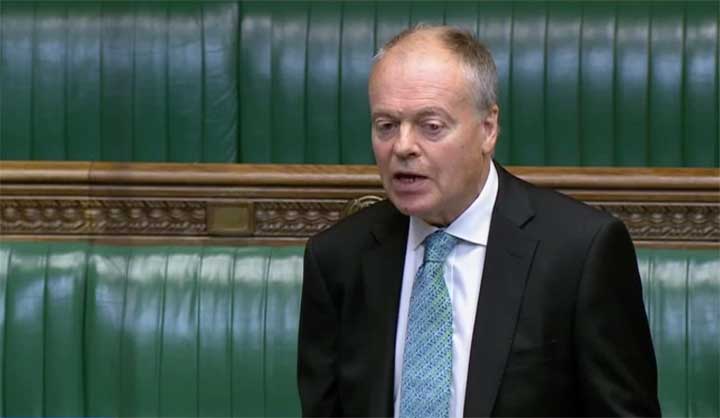
Updates, Friday June 12
Starmer: it’s unforgivable that buildings still have Grenfell cladding
Sir Keir Starmer has said it is “unforgivable” that hundreds of buildings still have Grenfell-style cladding on them three years after the tragedy. According to the latest available Government figures, 307 high-rise towers were still waiting the completion of remediation work for ACM cladding at the end of April.
Dangerous tower blocks should be taken over – MPs
MPs have urged the government to take over residential tower blocks if owners fail to remove dangerous cladding. The housing committee says it’s “deeply shocking and completely unacceptable” that about 2,000 buildings in England are still potentially at risk nearly three years after the Grenfell fire.
Grenfell: 2,000 buildings still covered with dangerous cladding three years on from tragic fire
Two thousand high-risk residential buildings are still covered with dangerous cladding, according to a committee scrutinising the government. And support for those living in cladded buildings like Grenfell Tower “falls far short” of what is needed, a report from the Housing, Communities and Local Government (HCLG) committee says.
The Communities Select Committee says today that any block of flats that has not started work to remove combustible cladding by December 2020 should have the freehold compulsorily purchased.
The suggestion expresses MPs’ frustration at the lack of action in remediating buildings 1,000 days after the Grenfell tragedy.
The full report is here.
The use of compulsory purchase orders echoes a view expressed by Stephen (Lord) Greenhalgh, the government minister tasked with sorting the cladding scandal. The committee wants “a new national body whose sole purpose is to purchase the freehold and manage the remediation of buildings with serious fire safety defects”.
This is not going to accord with the orchestrated mood music played by freehold owning entities such as Consensus Business Group (Vincent Tchenguiz), Long Harbour (Will Astor, trained by Tchenguiz) or Wallace Estates (owned by mysterious, Norfolk-based Italian Count Luca Rinaldo Contardo Padulli).
Singing from a remarkably similar hymn sheet, the freeholders called for near limitless generosity by other people – taxpayers, in this case – to sort out problems which, unresolved, mean their investments are worthless. (See below)
The committee said the £1 billion will not be enough to deal with all 1,700 buidings with non-ACM cladding. It would only be enough for around 600 buildings, “a third of the of the number the Government accepts are at the highest risk”.
MPs had twigged that government is still playing games with unexplained and random exclusions from the fund: sites where works had started before March 2020 were ineligible for public money; ditto sites below 18 metres; and a two-month window of opportunity to apply for the money.
“With a limited application window, the effective exclusion of social housing providers, and a ban on applications where works started before March 2020, the Government is clearly trying to find ways to fit a £3 billion liability into a £1 billion funding pot,” it said.
“These exclusions are wrong and funding should not be allocated on a first-come first-served basis.”
In addition, “The Building Safety Fund will need to be increased to address all fire safety defects in every high-risk residential building – potentially costing up to £15 billion.”
The committee urged government to pay for interim safety measures such as waking watch and alarms.
“If the Government doesn’t provide additional funding, let us be clear: it means tens of thousands of residents sent massive bills for problems that aren’t their fault and which, in many cases, will be a financial burden from which they will never recover.”
But “it cannot be fair for the financial burden of remediating buildings to rest solely with taxpayers. On individual buildings, we would support the Government taking legal action to ensure those responsible are made to pay.”
LKP believes that as there is no court ruling laying responsibility on government – or developers and warranty providers, still less the “building owner” speculators in ground rents – leaseholders are constantly having to be petitioners of government goodwill.
The Communities Select Committee refers to the impact on the physical and mental health of leaseholders caught up in the cladding scandal, which were so persuasively expressed in yesterday’s UKCAG report.
The Communities Select Committee thanked Rituparna Saha, of the UK Cladding Action group, and Alex Di Giuseppe, of Manchester Cladiators for “so clearly and passionately representing the views of affected residents in evidence to us”.
LKP’s submission
 Loading…
Loading…
What freeholders told the committee …
Consensus Business Group (Prop: Vincent Tchenguiz)
Consensus Business Group Residential (CBG) owns the freeholds of c.239,000 residential units financed by UK institutions and asset manages a further c.75,000 units owned by institutional freeholders.
It did not add that all CBG freeholds have loans to Goldman Sachs founded (but on longer owned) Rothesay Life, which receives the ground rent income.
CBG says:
“Professional freeholders have a long-term interest in the building and it is their role to protect the interests of leaseholders and mitigate these costs as far as possible. Leaseholders could be liable to pay a contribution towards the cost of the remedial works, depending on the wording of their lease agreements, but it is patently unfair that leaseholders should have to pay for such works.”
Solution: “Building RE” Freeholders have been working hard to fix these buildings as quickly as possible but central funding is essential for the acceleration of this process and to make these buildings safe as quickly as possible.
Whilst the expansion of the fund is welcome, the Government must introduce a longer-term funding solution that will spread the burden of these costs as widely as possible. To that end, the industry is calling for a single, centralised and ring-fenced “Building RE” fund that will serve as a long-term solution. This would be initially resourced by the Government but would be repaid by industry over time.
There are a number of ways this could be achieved:
- A building control levy on the sale of every new-build apartment property.
- A charge (tax) paid by the developer upon the sale of freehold.
- An increase to Insurance Premium Tax.
- A VAT charge on the sale of new-build properties.
The levy would be charged on both flats and houses, notwithstanding that only 20% of all new-builds are flats. This is to ensure adequate funds are raised and avoid shifting of development from flats to houses to avoid the levy.
The cladding levy would be paid on all flats and houses built and/or sold after the inception date in both the private and public sector. This would include all private and public housing developed and held for rent without being sold (i.e. build to rent).
The total annual funding raised is estimated at £450m [based on 2020 estimate of 180,000 new-builds x £250k average sales value x 1% levy]. Over 10 years the fund would raise approximately £5bn.
Long Harbour (Prop: William Waldorf Astor)
On behalf of its clients, Long Harbour has invested approximately £2bn in the UK residential sector – “mainly pension funds” – including ground rent portfolios valued in excess of £1.4bn, comprising over 190,000 leasehold properties across the UK. It is now the second largest manager of freeholds in the UK: 190,000 leasehold properties.
In common with leaseholders, the freeholder played no role in the design or construction of these buildings. Yet, using expert resources, the freeholder has been able to lead the immensely time consuming and complex process of remediation. This is one of many examples that demonstrate the
continued need for professional oversight in apartment buildings.
Potential Solution: “Building Re” Responsible parties including freeholders have been working hard to fix these buildings as quickly as possible but central funding is essential for the acceleration of this process and to make these buildings safe as quickly as possible.
Whilst the expansion of the fund is welcome, the Government must introduce a longer-term funding solution that will spread the burden of these costs as widely as possible. To that end, the industry is calling for a single, centralised and ring fenced “Building RE” fund that will serve as a long-term solution.
This was originally discussed with the former Secretary of State at the Ministry of Housing, Communities and Local Government Rt Hon James Brokenshire MP at a roundtable attended by a wide variety of stakeholders [= no leaseholders] in October 2018. This would be initially resourced by the Government but would be repaid by industry over time. (See above, where Consensus outlines the plan.)
Wallace Estates (Prop: Count Luca Rinaldo Contardo Padulli)
Wallace Partnership Group Limited owns and manages some 106,000 freehold titles in England and Wales, 99% of which are financed by pension funds, it claims. Wallace consists of a number of freeholder companies, as well as a management company (Simarc Property Management Limited).
It is owned by mysterious, Norfolk based Count Luca Rinaldo Contardo Padulli.
Professional freeholders have played and continue to play a key role in the remediation of affected buildings.
Insurance has become a major problem for leaseholders in affected buildings across the country. It has become clear that many private insurance companies have been substantially increasing premiums on buildings with unsafe cladding materials or fire defects, or refusing to provide cover at all. We are aware of at least one development which cannot currently source insurance cover (and where potentially individual mortgage terms have been breached) and others where the premium has increased by a factor of ten.
We believe that the Government needs to work with the insurance sector to see how these premiums can be kept at a lower rate, as many leaseholders across the country are being financially burdened.
Solution: lots of money from somebody else.





 23% of cladding leaseholders have considered suicide or self-harm, says compelling UKCAG report
23% of cladding leaseholders have considered suicide or self-harm, says compelling UKCAG report






















Has there been a response to the ‘Open letter to Robert Jenrick’ ?
Perhaps we could also hear if the opinions of Grant Shapps and Baroness Hanham have changed somewhat? or are they keeping their heads down now…. below is a quote from the Open letter..
[We at Leasehold Knowledge Partnership have spent over a decade trying to help ministers, officials and MPs understand the serious failures in leasehold law across the social, private and retirement sectors. It would be fair to say that our input has not always been welcomed at the time, even though history shows we were right.
Minister Grant Shapps and officials were keen to tell me and my local MP on a number of occasions in 2011 that I was simply wrong.
They assured everyone that leasehold law was “balanced” and “mostly working well”. ]
Yes it was working very well for Freeholding companies and their ‘clandestine’ clients.